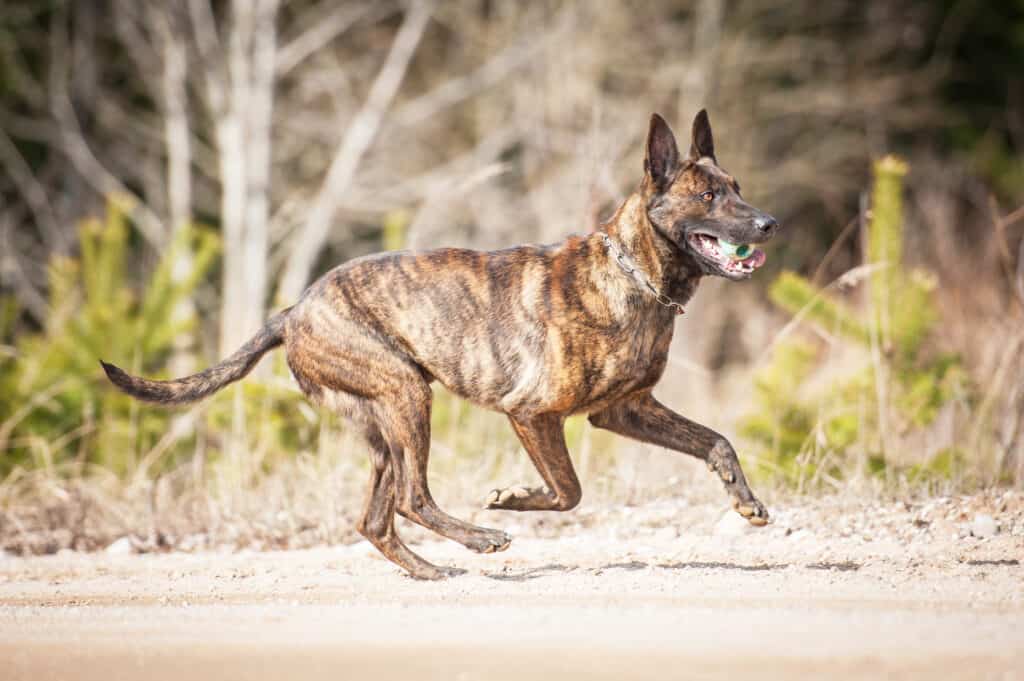Dutch Shepherd
Canis lupus
Advertisement
Dutch Shepherd Scientific Classification
- Kingdom
- Animalia
- Phylum
- Chordata
- Class
- Mammalia
- Order
- Carnivora
- Family
- Canidae
- Genus
- Canis
- Scientific Name
- Canis lupus
Read our Complete Guide to Classification of Animals.
Dutch Shepherd Conservation Status
Dutch Shepherd Facts
- Diet
- Omnivore
Dutch Shepherd Physical Characteristics
Dutch Shepherd as a Pet:
- General Health
- Energy Level
- Shedability
- Trainability
- Intelligence
- Tendency to Chew
- Size
- Family and kid friendliness
- Yappiness / Barking
- Low
- Separation Anxiety
- Low
- Preferred Temperature
- Cold climate
- Exercise Needs
- High
- Friendly With Other Dogs
- High
- Pure bred cost to own
- $3500
- Dog group
- Herding
- Male weight
- 55-70 lbs
- Female weight
- 45-60 lbs
View all of the Dutch Shepherd images!
The Dutch Shepherd is a sheep-herding dog hailing from the Netherlands, in use by shepherds and farmers for keeping flocks in line. These dogs are naturally occurring shepherd dogs in rural areas of the Netherlands, and officials first wrote the breed standards in 1898. Initially, the Dutch Shepherd’s coat could be any color. In 1914, the rules were adapted to allow only brindle coloring, to better distinguish the dog type from Belgian Shepherds and German Shepherds. Dutch Shepherds maintain the same characteristics as they have over a century ago and stand apart from other shepherd breeds due to their coloring and head shape.
These dogs are lively and intelligent and carry a strong herding instinct. They are able to make independent decisions on the fly. They are slightly obstinate requiring an experienced trainer to bring them to heel, and lack of training can lead to stubbornness. As a result, they will make their own decisions without proper training. These animals are competent workers and fiercely loyal to their families. They display an aptitude for all kinds of tricks, work, and sports.
Dutch Shepherds’ solid and muscular bodies allow them to run up to 37 miles per hour. This is helpful for their job guarding the Dutch border next to Dalmatia.
The Best Dog Food For Dutch Shepherd
Dutch Shepherds are highly active and require ample, well-balanced nutrition from whole-food ingredients to reach their peak health. However, determining just how much food to give your dog can be challenging and require some trial and error before landing on a consistent measurement. Many good dog foods for Dutch Shepherds provide optimal serving sizes based on your dog’s weight and age, but a vet can help you fine-tune and offer an ideal diet for your pup.
Ideally, your dog can access an environment with plenty of physical stimuli and exercise and will avoid weight gain. Most owners discourage free-feeding to prevent the likely joint pain and other health issues associated with overweight dogs.
We at A-Z Animals believe that one of the best foods for this breed is Sport Food’s Elite Series for Herding Dogs. Their formula is specifically created to address the nutritional needs of highly active working dogs that help them keep pace with their high-demand lifestyle. This particular variety features buffalo meat, a lean protein usually acceptable to even the most sensitive stomachs. This variety is also:
- Grain and legume-free
- High-calorie (for smaller portions)
- Sized for mid-to-large breeds
3 pros and cons of owning a Dutch Shepherd
| Pros! | Cons! |
| Highly intelligent and easily trainableThese shepherds are quick-witted and eager to please, learning commands quickly. | Can become overprotectiveIf not well-trained, the dogs can become protective of their families and wary of strangers. |
| Exceedingly loyalDutch Shepherds were made to work as a partner to their owners and will show you undying loyalty. | Need strict boundaries Owners need to remind these shepherds who the Alpha is; otherwise they’ll try to lead the pack. |
| Healthy with low medical maintenanceThis breed has no common health concerns, likely saving you money on vet bills. | A rare breedDutch Shepherds are rarer than their German counterparts, and it can be hard to find high-quality puppies. |
Dutch Shepherd Size and Weight
The Dutch Shepherd female’s average height ranges between 18 and 22 inches, with males capable of growing about two inches taller. Males can weigh up to 70 pounds when fully grown, and females weigh about 60 lbs.
| Height (Male) | 24’ Tall |
| Height (Female) | 22’ Tall |
| Weight (male) | 70lbs, fully grown |
| Weight (female) | 60lbs, fully grown |
Dutch Shepherd Common Health Issues
Interestingly, the Dutch Shepherd enjoys a bill of health relatively free from common health conditions compared to other shepherd family members. As an athletic breed of medium size, the most common issues afflicting them are hip and elbow dysplasia and other joint conditions. A Dutch Shepherd can also develop inflammatory bowel diseases and other digestive problems or atopic skin diseases. Choosing a diet with plenty of nutrition and optional supplements can help boost skin and joint wellness.
Of course, it all boils down to the breeder from which you acquire your pup. A conscious breeder will test to make sure there’s no family history of genetic diseases and that your dog is set up for healthy success.
Dutch Shepherd Temperament
With proper obedience and discipline training, Dutch Shepherds can accomplish amazing feats, such as serving as search-and-rescue dogs or partnering with law enforcement. These dogs are loyal, reliable, and ever-watchful of their families and flocks. Their shepherd temperament makes them love to work as a team with their owners and can deal as independent agents for any task they receive. However, it’s essential to give these dogs a strong sense of structure and hierarchy, or they’ll perceive a lack of leadership in the pack and step in to assume the role.
How To Take Care of Dutch Shepherd

According to breed specifications, Dutch Shepherd coats can either be gold brindle or silver brindle and appear in long or short lengths or rough textures, each with its own grooming requirements.
©Rita_Kochmarjova/Shutterstock.com
If you recently adopted or purchased a Dutch Shepherd or a new puppy, there are many factors to keep in mind when considering how to give them a healthy and happy life. From a highly active lifestyle to plenty of space to run about, these dogs have breed-specific factors that need to be addressed.
Maintenance And Grooming
According to breed specifications, Dutch Shepherd coats can either be gold brindle or silver brindle and appear in long or short lengths or rough textures, each with its own grooming requirements. Short-hair dogs only require the occasional brushing, with a switch to daily during seasonal shedding in the spring and autumn. Longhaired dogs require more regular grooming, about once a week, and should be kept clean depending on their work or environment. Rough-haired shepherds should be combed once per month and stripped twice yearly as needed.
Regardless of variety, these dogs should have their nails trimmed regularly to avoid cracking or painful overgrowth, which can cause walking or joint issues. Periodically clean their ears to keep them infection-free, and brush teeth once a day to keep their breath fresh and their mouth free of gingivitis.
Training
Dutch Shepherds are impressively intelligent, love a challenge, and are eager to prove their smarts. Shorter training sessions go a long way, inspiring the dogs to become more driven as the tricks and work demand more mental energy. Lacking obedience training, dogs will become highly independent and make decisions that often conflict with their masters’. With proper training, however, these shepherds excel at tricks, agility, dog shows, law enforcement, scent detection and tracking, herding, and many more fields of work and sport.
Exercise
Farmers originally trained the Dutch Shepherd to be an all-purpose agriculture dog, so it needed to be able to herd, guard, and follow instructions. These dogs don’t like being lazy at home; they want to work together as partners to accomplish tasks. They require high levels of energetic exercise, ideally more than an hour a day, which will soothe any anxiety and make them an excellent member of any active family.
Puppies
Puppy Dutch Shepherds are adorable creatures and perfect for families actively attentive to their dogs. They do best in large homes with experienced dog owners who know how to train with positive reinforcement and have no shortage of work to teach. New dog owners can successfully train a Dutch Shepherd puppy with consistent work and practice; however, research if the dog’s care needs fit your family’s lifestyle.
Dutch Shepherd And Children
These dogs are excellent family members and fit well with children and other pets. As long as they have plenty of space to exercise in and loads of mental and physical stimulation, Dutch Shepherds are patient and tolerant companions to young kids. However, most dogs should be supervised around young children or those with little exposure to dogs, as a constantly prodding toddler may test even these dogs’ patience.
Dogs similar to Dutch Shepherd
The Dutch Shepherd is closely related to several shepherd breeds, including the German Shepherd, Malinois, and White Swiss Shepherds.
- German Shepherd: The difference between these two shepherd types are their coat coloring, lifespan, and country of origin. German Shepherds are much more popular and available and, as such, fetch a more reasonable price.
- Belgian Malinois: The fur coloring and texture is the key difference between the Belgian Malinois and the Dutch variety.
- White Swiss Shepherd: Also called Berger Blanc Suisse, these dogs stand apart from their Dutch counterparts thanks to their snowy white fur and country of origin.
Popular Names for Dutch Shepherd
Popular names for Dutch Shepherd dogs include:
- Kahuna
- Rocky
- Ernst
- Zeus
- Piper
- Roxy
- Marge
Up Next
View all 110 animals that start with DDutch Shepherd FAQs (Frequently Asked Questions)
How much does Dutch Shepherd cost to own?
On average, a puppy fetches between $1,000-2,000 depending on the breeder and the dog’s pedigree. However, show dogs bred for competition can get as expensive as $3,500. Conversely, adopting a dog from a shelter averages around $300.
Is Dutch Shepherd good with kids?
With proper training and stimulation, this breed is excellent, patient, and loving with children of all ages.
How long does a Dutch Shepherd live?
Dutch Shepherds have a lifespan of 11 to 14 years, in line with the average medium-large breed timeline.
Thank you for reading! Have some feedback for us? Contact the AZ Animals editorial team.
Sources
- American Kennel Club, Available here: https://www.akc.org/dog-breeds/dutch-shepherd/
- Dutch Shepherd Dog Club of America, Available here: http://www.dsdca.org/home.html
- Working Dutch Shepherd Association of America, Available here: http://www.workingdutchshepherd.org/

















